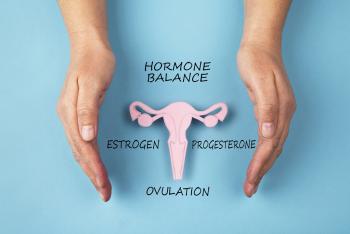Urinary tract infections (UTIs), bacterial infections of the bladder, are common health conditions...
Read More

You may have heard of polycystic ovary syndrome (PCOS) before: Between five and 10 percent of women have PCOS, which makes it a common health issue, and many find out when they have difficulty getting pregnant.
PCOS is a hormonal imbalance where the body produces more androgens—hormones associated with male characteristics and reproductive activity—than usual. This impacts how the ovaries work. When a person has PCOS, their eggs might not develop properly, or they might not be released regularly during ovulation.
“This hormonal imbalance means that someone may have irregular or infrequent menstrual periods, and they may have issues with infertility,” said Paul Osterdahl, D.O., OBGYN at Inspira Medical Group. “They may also develop small cysts in the ovaries, but it’s important to know that despite the name, not everyone with polycystic ovary syndrome develops cysts, and not everyone with cysts has PCOS.”
In addition to irregular periods, symptoms to look for include:
“Importantly, these symptoms could be signs of PCOS, but they could be symptoms of another issue. It’s best to see your primary care provider or gynecologist for a proper diagnosis,” said Dr. Osterdahl.
Beyond being diagnosed and treated so that you can become pregnant, it’s important to seek treatment for PCOS because it’s often linked with other serious health conditions like prediabetes and diabetes, high cholesterol, high blood pressure, heart conditions, endometrial cancer, sleep apnea, depression and anxiety.
To make a diagnosis, your provider will first discuss your family and medical history and conduct a physical exam, including a pelvic exam. In addition, they may recommend a pelvic ultrasound to view the size of your ovaries, and the presence of cysts, and a blood test to view your hormone levels. To be diagnosed with PCOS, patients must meet two of these three criteria:
There are several ways to treat and manage PCOS, depending on whether you are trying to become pregnant or not. Your provider may recommend losing weight to manage symptoms, as well as a combination of medications depending on whether or not you’re trying to become pregnant.
For those not trying to become pregnant, an oral contraceptive containing estrogen and progestin can regulate menstrual periods and reduce androgen levels. For those trying to become pregnant, a medication to spur ovulation may help.
“Other medications can be prescribed to manage hair growth and skin issues,” said Dr. Osterdahl. “But lifestyle changes are patients’ best bets for controlling PCOS and the other health issues related to it."
To find out more about Inspira’s Gynecological Services or to a find a provider, click here.

Urinary tract infections (UTIs), bacterial infections of the bladder, are common health conditions...
Read More
Prioritizing cervical health is a lifelong commitment—from HPV vaccinations in adolescence to...
Read More
Midwives offer a compassionate, patient-centered approach. With an emphasis on consent and shared...
Read More
The material set forth in this site in no way seeks to diagnose or treat illness or to serve as a substitute for professional medical care. Please speak with your health care provider if you have a health concern or if you are considering adopting any exercise program or dietary guidelines. For permission to reprint any portion of this website or to be removed from a notification list, please contact us at (856) 537-6772